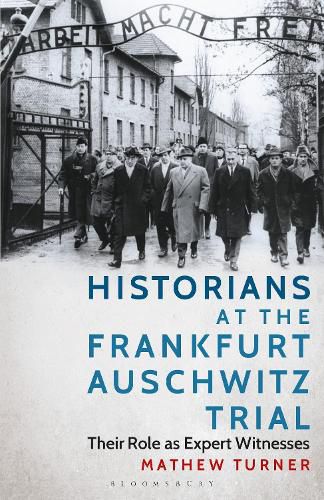Readings Newsletter
Become a Readings Member to make your shopping experience even easier.
Sign in or sign up for free!
You’re not far away from qualifying for FREE standard shipping within Australia
You’ve qualified for FREE standard shipping within Australia
The cart is loading…






The Frankfurt Auschwitz trial was a milestone event in West German history. Between 1963 and 1965, twenty-two former Auschwitz personnel were tried in Frankfurt am Main. It was a trial that saw the engagement of four of the nation’s leading historians as expert witnesses - Martin Broszat, Hans Buchheim, Helmut Krausnick, and Hans-Adolf Jacobsen - appointed by the prosecution to give evidence pertaining to the historical and organisational context of the Holocaust. Following the trial, the reports of these historians were published in a bestselling book, Anatomie des SS-Staates (Anatomy of the SS State) and Mathew Turner here investigates the relationship between the trial and this publication. In recent years, more attention has been paid to the intersection between history and law that accompanies historians’ entry into the courtroom. Very little, however, has been written about this intersection with a focus on a single case study. Based on original research in several German archives and first-hand interviews, Turner addresses these connections through a study of West Germany’s most famous trial, and the monumental work of history produced from the engagement of historical expertise in court.
$9.00 standard shipping within Australia
FREE standard shipping within Australia for orders over $100.00
Express & International shipping calculated at checkout
The Frankfurt Auschwitz trial was a milestone event in West German history. Between 1963 and 1965, twenty-two former Auschwitz personnel were tried in Frankfurt am Main. It was a trial that saw the engagement of four of the nation’s leading historians as expert witnesses - Martin Broszat, Hans Buchheim, Helmut Krausnick, and Hans-Adolf Jacobsen - appointed by the prosecution to give evidence pertaining to the historical and organisational context of the Holocaust. Following the trial, the reports of these historians were published in a bestselling book, Anatomie des SS-Staates (Anatomy of the SS State) and Mathew Turner here investigates the relationship between the trial and this publication. In recent years, more attention has been paid to the intersection between history and law that accompanies historians’ entry into the courtroom. Very little, however, has been written about this intersection with a focus on a single case study. Based on original research in several German archives and first-hand interviews, Turner addresses these connections through a study of West Germany’s most famous trial, and the monumental work of history produced from the engagement of historical expertise in court.